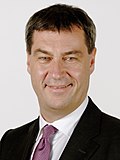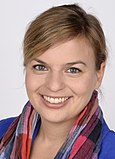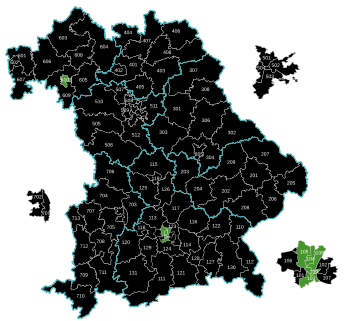State election in Bavaria 2018
(72.3% turnout - 1.0% invalid votes)
The state election in Bavaria 2018 was the 18th state election in Bavaria after the Second World War and took place on October 14, 2018. At the same time as the election to the Bavarian State Parliament , the seven Bavarian District Days were elected.
At 72.3%, there was the highest turnout since 1982 . While the CSU achieved their worst result since 1950 and the SPD their worst result in a state election in Bavaria since 1893, the AfD, which started for the first time, and the FDP, which resigned in 2013, made it into the state parliament. The Greens and the Free Voters each achieved their best results in a state election in Bavaria. The former were clearly the second strongest force and won six direct mandates for the first time .
Election date and preparation deadlines
According to the Bavarian Constitution, the election is to be set on a Sunday "at the earliest 59 months, at the latest 62 months" after the previous state election , which took place on September 15, 2013. An election date between August 19 and November 11, 2018 was possible. In practice, the elections since 1978 have always been between mid-September and mid-October. The Bavarian state government proposed on January 9, 2018 to October 14, 2018 as the election date forward and put him officially after hearing the parliament parties on 20 February determined.
The key date for determining the number of inhabitants, which are decisive for the distribution of the 180 state parliament mandates between the seven Bavarian administrative districts and a possible redistribution of the electoral districts, was June 15, 2016 (33 months after the election of the previous state parliament). On this basis, the Bavarian Ministry of the Interior had to submit a district report to the state parliament up to 36 months after the election. This took place on September 6, 2016.
Delegates to the internal assembly meetings could not be appointed until 43 months after the previous election at the earliest, i.e. since April 16, 2017. The actual listing of constituency candidates was permitted since July 16, 2017. The parties and other organized groups of voters who have not been continuously represented in the Bavarian State Parliament or in the German Bundestag since their last election on the basis of their own election proposals ( CDU , CSU , SPD , Free Voters , Greens , FDP , Left , AfD ) had to give their intention to participate Report the state returning officer by the 90th day before the election, i.e. by July 16, 2018 at the latest. The actual election proposals and any necessary supporting signatures had to be submitted by August 2, 2018.
Starting position
Since the state elections in Bavaria in 2013 , the CSU again had an absolute majority of the mandates, as it did from 1962 to 2008. Due, among other things, to the poor performance of the CSU in the 2017 federal election , Prime Minister Horst Seehofer ( CSU ) finally announced in December 2017 that he was not going to run for the top candidacy in the state elections in Bavaria in 2018 and also resigned as Prime Minister in March 2018 before the end of the election period from. The previous Bavarian Finance Minister Markus Söder was elected as the new CSU top candidate and later also in the state parliament as Bavarian Prime Minister .
Top candidates of the parties represented in the state parliament before the election
| CSU | SPD | Free voters | Alliance 90 / The Greens |
|---|---|---|---|
| Markus Söder | Natascha Kohnen | Hubert Aiwanger | Katharina Schulze and Ludwig Hartmann |
Leading candidates from other parties
Leading candidates from parties that were not represented in the state parliament before the election:
- FDP: Martin Hagen
- The left: Ates Gürpinar and Eva Bulling-Schröter
- Bavaria Party: Florian Weber
- ÖDP: Agnes Becker
- Pirate Party Bavaria: Benjamin Wildenauer
- AfD: not a top candidate
Parties
Political parties and electoral groups that won less than 1.25% of the total valid votes in the last state election had to collect support signatures for their election proposals .
The constituency committees decided on August 17, 2018 whether to approve the nominations. A total of 18 parties and voter groups took part in the election, 12 of them in all seven administrative districts. These are (in the order on the ballot papers; the respective abbreviation in brackets):
- Christian Social Union in Bavaria (CSU)
- Social Democratic Party of Germany (SPD)
- Free Voters (FREE VOTERS)
- Alliance 90 / The Greens (GREENS)
- Free Democratic Party (FDP)
- The Left (DIE LINKE)
- Bavarian Party (BP)
- Ecological Democratic Party (ÖDP)
- Pirate Party Germany (PIRATES)
- Party for Franconia (DIE FRANKEN) (only candidates in Middle Franconia and Lower Franconia)
- Alternative for Germany (AfD)
- Liberal-Conservative Reformers (LKR) (only candidates in Upper Bavaria and Swabia)
- courage
- Party of Humanists (Die Humanisten) (only ran for candidates in Upper Bavaria)
- Party for Labor, Rule of Law, Animal Welfare, Elite Promotion and grassroots initiative (Die PARTEI) (did not run in Lower Bavaria)
- Party for Health Research (Health Research) (candidates only in Upper Bavaria, Upper Palatinate, Upper Franconia and Middle Franconia)
- Human Environment Animal Welfare Party (Animal Welfare Party ) (only candidates in Upper Bavaria, Lower Bavaria and Lower Franconia)
- V-Party 3 - Party for Change, Vegetarians and Vegans (V-Party 3 )
Electoral system
In contrast to the federal election law, the first votes are also taken into account in the distribution of seats by proportional representation. There is no nationwide equalization of proportions, the distribution of seats takes place within the seven administrative districts , which are referred to in the electoral law as electoral districts . Parties and groups of voters who get at least 5% of the total votes (sum of first and second votes) in Bavaria participate in the distribution of seats. The constituencies are divided into electoral districts, in each of which one member is directly elected. The number of constituencies is around half of the seats in the constituency.
Constituency and constituency changes
In the statutory electoral district report in September 2016, the state government stated that the numerical distribution of the 180 state parliament mandates among the seven administrative districts, which also form the constituencies, had to be changed due to changes in the population. It was recommended that a list mandate previously awarded in the constituency of Lower Franconia be awarded to the constituency of Upper Bavaria.
Within Upper Bavaria, with the additional mandate, the electoral districts in the state capital Munich were redesigned, as two - Giesing and Milbertshofen - exceeded the average population by more than 15 percent. For the 2018 election, Upper Bavaria now has 31 constituencies, 9 of which are in the state capital.
Seats and constituencies are distributed as follows:
| Seats * | voting circles |
|
|---|---|---|
| Upper Bavaria constituency | 61 | 31 |
| Lower Bavaria constituency | 18th | 9 |
| Upper Palatinate constituency | 16 | 8th |
| Upper Franconia constituency | 16 | 8th |
| Middle Franconia constituency | 24 | 12 |
| Lower Franconia constituency | 19th | 10 |
| Constituency of Swabia | 26th | 13 |
| total | 180 | 91 |
TV duels
A TV duel between Prime Minister Markus Söder (CSU) and Ludwig Hartmann (Alliance 90 / The Greens) took place on September 26th. The Bavarian Television founded the party selection resulting in Bavaria trends of 12 September, after which CSU and Greens could hope in choosing the most votes. SPD general secretary Uli Grötsch described this decision as “completely absurd.” On September 28th, a broadcast followed with representatives of the other five parties whose survey results were above or near the five percent hurdle : Natascha Kohnen (SPD), Hubert Aiwanger ( Free voters), Martin Sichert (AfD), Martin Hagen (FDP) and Ates Gürpinar (left). The first broadcast was moderated by BR editor-in-chief Christian Nitsche , while Ursula Heller was co-moderator on the second broadcast .
Result
| Political party | First votes |
Second votes |
Overall votes |
Sum in percent |
Difference to 2013 |
Seats (total) |
Difference to 2013 |
Direct mandates |
Difference to 2013 |
|---|---|---|---|---|---|---|---|---|---|
| Valid votes / total seats |
6,796,249 | 6,768,498 | 13,564,747 | 100.0% | - | 205 | +25 | 91 | +1 |
| CSU | 2,495,186 | 2,550,895 | 5,046,081 | 37.2% | −10.5% | 85 | −16 | 85 | −4 |
| GREEN | 1,196,575 | 1,195,781 | 2,392,356 | 17.6% | + 9.0% | 38 | +20 | 6th | +6 |
| FREE VOTERS | 809.666 | 763.126 | 1,572,792 | 11.6% | + 2.6% | 27 | +8 | 0 | 0 |
| AfD | 701.384 | 687.238 | 1,388,622 | 10.2% | + 10.2% | 22nd | +22 | 0 | 0 |
| SPD | 680.180 | 628,898 | 1,309,078 | 9.7% | −11.0% | 22nd | −20 | 0 | −1 |
| FDP | 353,800 | 336.699 | 690.499 | 5.1% | +1.8% | 11 | +11 | 0 | 0 |
| THE LEFT | 220.031 | 217.857 | 437,888 | 3.2% | +1.1% | ||||
| BP | 122.266 | 109,465 | 231.731 | 1.7% | −0.4% | ||||
| ÖDP | 111,212 | 100,739 | 211,951 | 1.6% | −0.5% | ||||
| PIRATES | 23,900 | 35,245 | 59,145 | 0.4% | −1.5% | ||||
| The party | 18,561 | 40,535 | 59.096 | 0.4% | + 0.4% | ||||
| courage | 17,992 | 27,498 | 45,490 | 0.3% | + 0.3% | ||||
| Animal welfare party | 11,616 | 29,281 | 40,897 | 0.3% | + 0.3% | ||||
| V party³ | 15,266 | 19,243 | 34,509 | 0.3% | + 0.3% | ||||
| THE FRANKS | 17,075 | 14,378 | 31,453 | 0.2% | −0.5% | ||||
| Health research | 1.006 | 6,744 | 7,750 | 0.1% | + 0.1% | ||||
| The humanists | 159 | 3.234 | 3,393 | 0.0% | + 0.0% | ||||
| LKR | 374 | 1,642 | 2.016 | 0.0% | + 0.0% | ||||
The CSU won 85 of the 91 electoral districts, the Greens six (five in Munich and one in Würzburg). In every constituency except Lower Franconia there was at least one overhang mandate. The CSU received a total of 10 overhang mandates, the other parties 15 compensation mandates (FW 5, Greens 4, SPD 4, AfD 1, FDP 1). This enlarged the state parliament from 180 to 205 seats.
The turnout of 72.3 percent was 8.7 percentage points higher than in 2013 (plus almost 850,000 voters; including 0.4 percent increase in the number of eligible voters). Thus, more than a quarter of those eligible to vote did not take part in the election. One percent of the votes cast were invalid (average of first and second votes).

| Non-voters × 2 (votes) | 5,254,784 |
| Votes not cast by voters | 1,660 |
| Invalid overall votes | 137,655 |
| Total votes for parties with no seats | 1,165,319 |
| Votes without any influence on the distribution of seats overall | 6,559,428 |
| Eligible voters × 2 (votes) | 18,958,856 |
| Share of votes without influence on the distribution of seats | 34.6% |
Survey
Sunday question
Last polls before the election
| Institute | date | CSU | SPD | FW | Green | FDP | left | AfD | Otherwise. |
|---|---|---|---|---|---|---|---|---|---|
| Research group elections | 10/11/2018 | 34% | 12% | 10% | 19% | 5.5% | 4% | 10% | 5.5% |
| INSA | 09.10.2018 | 33% | 10% | 11% | 18% | 5.5% | 4.5% | 14% | 4% |
| Research group elections | 05.10.2018 | 35% | 12% | 10% | 18% | 5.5% | 4.5% | 10% | 5% |
| Infratest dimap | 04.10.2018 | 33% | 11% | 11% | 18% | 6% | 4.5% | 10% | 6.5% |
| GMS | 09/27/2018 | 35% | 13% | 10% | 16% | 5% | 4% | 12% | 5% |
| INSA | 09/26/2018 | 34% | 11% | 10% | 17% | 6% | 4% | 14% | 4% |
| Research group elections | 09/21/2018 | 35% | 13% | 11% | 18% | 5% | 4% | 10% | 4% |
| Infratest dimap | 09/12/2018 | 35% | 11% | 11% | 17% | 5% | 5% | 11% | 5% |
| GMS | 09/11/2018 | 36% | 12% | 7% | 16% | 6% | 4% | 14% | 5% |
| State election 2013 | 09/15/2013 | 47.7% | 20.6% | 9.0% | 8.6% | 3.3% | 2.1% | - | 8.7% |
Older polls
| January - August 2018 | ||||||||||||||||||||||||||||||||||||||||||||||||||||||||||||||||||||||||||||||||||||||||||||||||||||||||||||||||||||||||||||||||||||||||||||||||||||||||||||||||||||||||||||||||||||||||||||||
|---|---|---|---|---|---|---|---|---|---|---|---|---|---|---|---|---|---|---|---|---|---|---|---|---|---|---|---|---|---|---|---|---|---|---|---|---|---|---|---|---|---|---|---|---|---|---|---|---|---|---|---|---|---|---|---|---|---|---|---|---|---|---|---|---|---|---|---|---|---|---|---|---|---|---|---|---|---|---|---|---|---|---|---|---|---|---|---|---|---|---|---|---|---|---|---|---|---|---|---|---|---|---|---|---|---|---|---|---|---|---|---|---|---|---|---|---|---|---|---|---|---|---|---|---|---|---|---|---|---|---|---|---|---|---|---|---|---|---|---|---|---|---|---|---|---|---|---|---|---|---|---|---|---|---|---|---|---|---|---|---|---|---|---|---|---|---|---|---|---|---|---|---|---|---|---|---|---|---|---|---|---|---|---|---|---|---|---|---|---|---|
|
| 2013-2017 | ||||||||||||||||||||||||||||||||||||||||||||||||||||||||||||||||||||||||||||||||||||||||||||||||||||||||||||||||||||||||||||||||||||||||||||||||||||||||||||||||||||||||||||||||||||||||||||||||||||||||||||||||||||||||||||||||||||||||||||||||||||||||||||||||||||||||||||||||||||||||||||||||||||||||||||||||||||||||||||||||||||||||||||||||||||||||||||||||||||||||||||||||||||||||||||
|---|---|---|---|---|---|---|---|---|---|---|---|---|---|---|---|---|---|---|---|---|---|---|---|---|---|---|---|---|---|---|---|---|---|---|---|---|---|---|---|---|---|---|---|---|---|---|---|---|---|---|---|---|---|---|---|---|---|---|---|---|---|---|---|---|---|---|---|---|---|---|---|---|---|---|---|---|---|---|---|---|---|---|---|---|---|---|---|---|---|---|---|---|---|---|---|---|---|---|---|---|---|---|---|---|---|---|---|---|---|---|---|---|---|---|---|---|---|---|---|---|---|---|---|---|---|---|---|---|---|---|---|---|---|---|---|---|---|---|---|---|---|---|---|---|---|---|---|---|---|---|---|---|---|---|---|---|---|---|---|---|---|---|---|---|---|---|---|---|---|---|---|---|---|---|---|---|---|---|---|---|---|---|---|---|---|---|---|---|---|---|---|---|---|---|---|---|---|---|---|---|---|---|---|---|---|---|---|---|---|---|---|---|---|---|---|---|---|---|---|---|---|---|---|---|---|---|---|---|---|---|---|---|---|---|---|---|---|---|---|---|---|---|---|---|---|---|---|---|---|---|---|---|---|---|---|---|---|---|---|---|---|---|---|---|---|---|---|---|---|---|---|---|---|---|---|---|---|---|---|---|---|---|---|---|---|---|---|---|---|---|---|---|---|---|---|---|---|---|---|---|---|---|---|---|---|---|---|---|---|---|---|---|---|---|---|---|---|---|---|---|---|---|---|---|---|---|---|---|---|---|---|---|---|---|---|---|---|---|---|---|---|---|---|---|---|---|---|---|---|---|---|---|---|---|---|---|---|---|---|---|---|---|---|---|---|---|---|---|---|---|---|---|---|---|---|---|---|---|---|---|
|
course
Hypothetical direct election Prime Minister
| Institute | date |
 Markus Söder ( CSU ) Markus Söder ( CSU )
|
 Natascha Kohnen ( SPD ) Natascha Kohnen ( SPD )
|
 Ludwig Hartmann ( Greens ) Ludwig Hartmann ( Greens )
|
none of the questions asked |
|---|---|---|---|---|---|
| Research group elections | 10/11/2018 | 46% | 30% | - | - |
| 44% | - | 23% | - | ||
| Research group elections | 05.10.2018 | 54% | 24% | - | 6% |
| 48% | - | 19% | 3% | ||
| Research group elections | 09/21/2018 | 50% | 26% | - | 5% |
| 42% | - | 19% | 4% | ||
| Infratest dimap | May 2nd, 2018 | 62% | 20% | - | 8th % |
| Infratest dimap | 10/01/2018 | 55% | 25% | - | 8th % |
Political fields relevant to elections
On behalf of the RTL / n-tv trend barometer, Forsa asked the survey participants about the “biggest problems at the state level”. “In Bavaria, 34 percent of those questioned named the CSU and Prime Minister Markus Söder. 28 percent named the issue of refugees, 26 percent the situation on the housing market. "
For the ARD preselection survey, Infratest dimap asked survey participants which topic was very important for their voting decision. In the order of most percentage points, these were school and education policy (55%), nature conservation in Bavaria (46%), creation of affordable housing (45%), reducing injustice in society (41%), security and the police (40 %), Regulation of immigration (39%), the behavior of Horst Seehofer in the federal government (26%), the cooperation between CDU, CSU and SPD in the federal government (21%).
After the election
The previous Prime Minister Markus Söder spoke on election evening of humility in view of the election result, but saw a clear government mandate for the CSU as the strongest party. The CSU chairman Seehofer wanted to take on responsibility in the future and - with the exception of the AfD - offered talks to all other parties elected to the state parliament. After initial exploratory talks three days after the election with top representatives, first of the Free Voters, then the Greens, the CSU Presidium announced a day later that they wanted to start coalition negotiations with the Free Voters immediately, due to the closest content. According to their own statements, the Greens hoped to “unite ecology and economy” with a coalition and criticized the CSU after the explorations had ended quickly for having missed a chance . Prime Minister Söder, on the other hand, stated that differences in content in the areas of asylum and internal security had made coalition negotiations with the Greens impossible, "it wouldn't even have failed due to ecology". The CSU and Free Voters emphasized the similarities as bourgeois parties ; Free childcare and the cancellation of the controversial third runway at Munich Airport were named for the negotiations .
On November 2, 2018, the CSU and the Free Voters agreed on a coalition. Two days later, the board members and parliamentary groups of both parties approved the coalition agreement, and the Söder II cabinet was formed.
Before the election , the Bavarian State Office for the Protection of the Constitution observed some of the 22 members of the AfD because of links to right-wing extremist, Islamophobic or Reich citizenship scenes. When asked by the taz , the office said it was examining whether the observation would be continued because of the “increased threshold for observation of elected officials”.
The new state parliament met for the first time on November 5, 2018. One day later, Markus Söder was re-elected Prime Minister with 110 votes to 89 with three abstentions.
See also
Web links
- State election Bavaria 2018 , provisional result with individual constituencies (graphic)
- Constituencies , on the website of the Land Returning Officer
- State election in Bavaria 2018 on the information portal on political education
- Representation of the voter migration, with interactive graphics , ARD page on the state election in Bavaria 2018
Individual evidence
- ↑ a b c Election to the 18th Bavarian State Parliament in Bavaria on October 14, 2018, final result (PDF; 10.7 MB) . Bavarian State Office for Statistics and Data Processing. Retrieved November 6, 2018.
- ↑ Election dates
- ^ Spiegel Online : Preliminary final result
- ↑ Article 16 (1) sentence 3 Bavarian Constitution
- ↑ State Returning Officer Bavaria: Overview of election dates and results , accessed on September 7, 2016
- ↑ Election dates
- ↑ Bavarian legal and administrative report : State government sets October 14 , 2018 as the date for state elections , report from February 20, 2018
- ↑ Article 21 (1) Bavarian State Election Law
- ↑ Article 5 (5) Bavarian State Election Law
- ↑ Bavarian State Ministry of the Interior, for Building and Transport: District report: Adjustment in the distribution of the seats and the constituencies , press release of September 7, 2016, accessed on September 7, 2016
- ↑ State Returning Officer: State Election 2018: Deadlines for the list of applicants
- ↑ Article 28 (2) Bavarian State Election Law
- ↑ Art. 24 LWG
- ↑ Art. 26 LWG
- ↑ merkur.de
- ↑ rosenheim24.de
- ↑ www.oedp.bayern.de
- ↑ piratenpartei-bayern.de
- ↑ www.welt.de
- ↑ Press release of the regional returning officer of August 21, 2018 (PDF; 166 kB)
- ↑ Bavarian State Government: Report of the Bavarian State Government on the change in the number of inhabitants in the electoral and electoral districts according to Art. 5 Para. 5 of the State Election Act of September 6, 2016 ( Memento of September 15, 2016 in the Internet Archive ), accessed on 7. September 2016
- ↑ Law amending the state electoral law. (PDF) Bavarian State Parliament, March 31, 2017, accessed on March 8, 2018 .
- ↑ Schwarz gegen Grün faz.net, September 18, 2018
- ↑ a b Election to the 18th Bavarian State Parliament in Bavaria on October 14, 2018 - final result - text, tables, graphs (PDF; 5.6 MB), page 9 . Bavarian State Office for Statistics. December 2019. Retrieved December 15, 2019.
- ↑ a b c d e f g h i j k l m n o p q r s t u v w x y z aa ab ac ad ae af ag ah ai aj ak al am an ao ap aq ar as at au av aw ax ay az ba bb bc bd be bf bg bh bi bj bk Wahlrecht.de : Election polls on the state elections in Bavaria .
- ↑ RTL / n-tv trend barometer: With its refugee policy, the CSU is harming itself and endangering political stability - AfD rises to 16 percent , on presseportal.de
- ↑ RTL / n-tv trend barometer: Most Bavarians reject the policies of Söder and Seehofer - State elections: Only 40 percent for CSU - 71 percent of Germans against going it alone nationally on the refugee issue, on presseportal.de
- ↑ Voters check: Bavaria is divided on the Police Task Act, clear majority for Krucifix and against Marx , on sat1.de, accessed on May 17, 2018.
- ↑ CSU remains in a low mood - Greens continue to grow , on zdf.de, accessed on October 11, 2018.
- ↑ ZDF Politbarometer Extra: CSU still in the deep - Greens remain in second place , on zdf.de, accessed on October 5, 2018.
- ↑ ZDF Politbarometer Extra: CSU in Bavaria in the deep - Greens clearly on the upswing , on zdf.de, accessed on September 21, 2018.
- ↑ Bavaria May 2018 on behalf of Bayerischer Rundfunk , on infratest-dimap.de, accessed on September 17, 2018.
- ↑ Bavaria January 2018 on behalf of Bayerischer Rundfunk and the program “Kontrovers” , on infratest-dimap.de, accessed on January 13, 2018.
- ↑ Many Bavarians consider Markus Söder to be a problem. Die Zeit , August 13, 2018, accessed on August 19, 2018 .
- ↑ Bavaria see CSU and Söder as a problem. N-TV , August 13, 2018, accessed August 19, 2018 .
- ↑ Ellen Ehni : CSU sinks to 33 percent. Tagesschau.de , October 4, 2018, accessed October 5, 2018 .
- ↑ Preliminary result: CSU sole rule ended - Greens strong , Bayerischer Rundfunk, October 15, 2018.
- ↑ CSU wants to start coalition negotiations with free voters , SZ from October 18, 2018
- ↑ The CSU lacked the courage , Green Bavaria , October 19, 2018.
- ↑ “It wouldn't even have failed because of ecology” , SZ of October 18, 2018
- ^ Coalition talks between CSU and Free Voters begin , BR24 , October 19, 2018.
- ^ FAZ: Bavaria's new government is in place
- ↑ VS observes AfD MPs. In: taz , October 19, 2018, p. 7.
- ↑ Süddeutsche Zeitung: Söder re-elected Prime Minister







